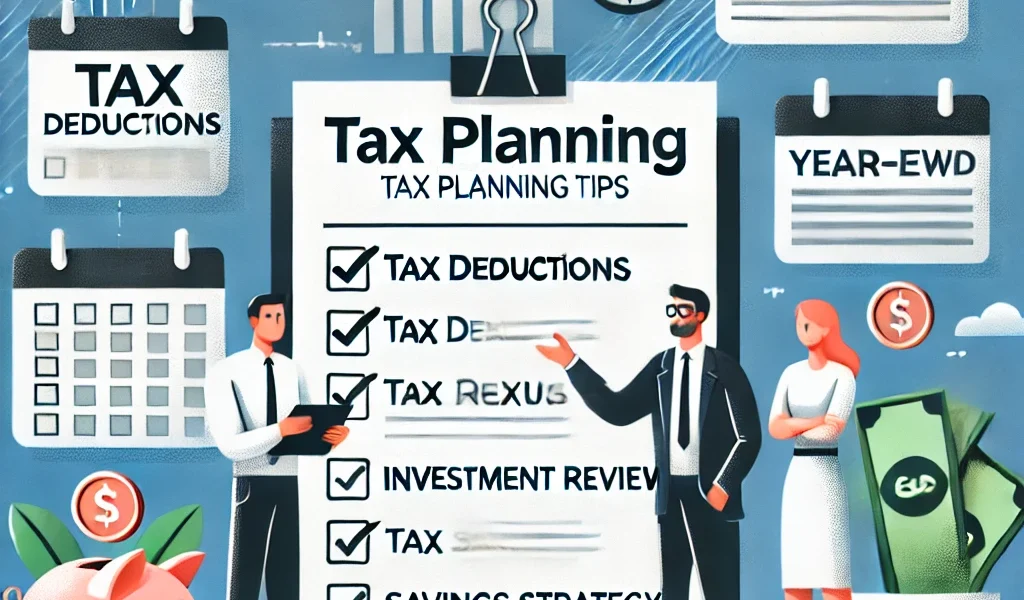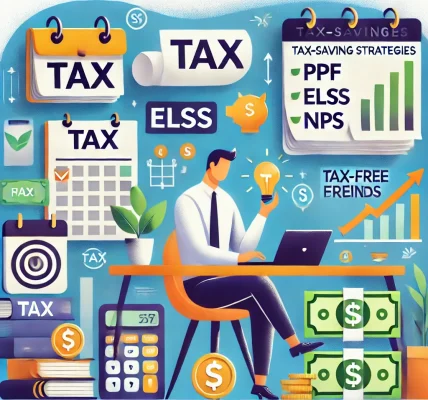Tax planning is a crucial financial exercise that helps individuals and businesses minimize tax liabilities and maximize savings. As the financial year-end approaches, it is the perfect time to review tax-saving strategies, optimize deductions, and ensure compliance with tax regulations. In this comprehensive guide, we will explore essential year-end tax planning tips to help you save more and avoid legal pitfalls.
1. Review Your Taxable Income and Deductions
One of the first steps in year-end tax planning is reviewing your income and available deductions. By understanding your taxable income, you can make strategic decisions to reduce your tax liability.
Key Actions:
- Check your salary slips, investment earnings, and other sources of income.
- Identify eligible deductions under sections like 80C, 80D, 80E, and 80G.
- Consider deferring bonuses or additional income to the next financial year if it helps reduce tax liability.
2. Maximize Deductions Under Section 80C
Section 80C of the Income Tax Act allows individuals to claim deductions up to ₹1,50,000 by investing in various instruments. Ensure you have fully utilized this limit before the financial year ends.
Eligible Investments and Expenses:
- Provident Fund (PF) Contributions
- Public Provident Fund (PPF)
- Equity-Linked Savings Scheme (ELSS)
- Life Insurance Premiums
- National Savings Certificate (NSC)
- Tuition Fees for Children
- 5-Year Fixed Deposit (FD) with Banks/Post Office
3. Utilize Health Insurance and Medical Expense Deductions
Under Section 80D, taxpayers can claim deductions for premiums paid on health insurance policies for themselves, their spouse, children, and parents.
Deductions Available:
- Self, Spouse & Children: Up to ₹25,000
- Parents Below 60 Years: Additional ₹25,000
- Parents Above 60 Years: Additional ₹50,000
- Preventive Health Check-ups: ₹5,000 within the overall limit
By securing health insurance before the year ends, you can not only protect your family but also avail of significant tax benefits.
4. Claim Tax Benefits on Home Loan Interest
If you have a home loan, ensure you are maximizing the tax benefits available under Section 80C and Section 24(b).
Tax Benefits on Home Loan:
- Principal Repayment: Up to ₹1,50,000 under Section 80C
- Interest Payment: Up to ₹2,00,000 under Section 24(b)
- First-time Home Buyers: Additional deduction of ₹50,000 under Section 80EE
Consider making an extra repayment before the year ends to maximize deductions.
5. Plan Capital Gains and Losses Smartly
If you have investments in stocks, mutual funds, or real estate, assess your capital gains and losses to optimize tax liability.
Tax Planning Strategies for Capital Gains:
- Offset capital gains with capital losses to reduce tax burden.
- Hold investments for the long term to qualify for lower tax rates on long-term capital gains.
- Invest in Capital Gains Bonds (Section 54EC) to save tax on real estate gains.
6. Donate to Charity and Claim Tax Deductions
Donations to registered charitable organizations are eligible for tax deductions under Section 80G.
Important Points:
- Ensure the charity is registered and eligible under Section 80G.
- Retain donation receipts and obtain the 80G certificate.
- Contributions to certain funds like PM CARES Fund qualify for a 100% deduction.
7. Optimize Business and Professional Expenses
For self-employed individuals and business owners, optimizing expenses before the year ends can reduce taxable income.
Key Steps:
- Prepay expenses like rent, utilities, and office supplies.
- Depreciate assets to claim maximum deductions.
- Contribute to NPS (National Pension System) under Section 80CCD(1B) for additional tax benefits.
8. Review and Update Investment Portfolio
Year-end is a good time to review your investments and align them with your financial goals.
Investment Actions:
- Exit underperforming investments and reinvest in tax-efficient options.
- Invest in tax-free bonds or municipal bonds for tax-exempt income.
- Ensure your asset allocation matches your risk tolerance and tax planning needs.
9. File Income Tax Returns on Time
Filing your income tax return (ITR) on time helps avoid penalties and interest charges. Ensure you have all necessary documents ready, including:
- Form 16 (Salary Certificate)
- Investment Proofs
- Bank Statements
- Home Loan Certificates
- Medical and Insurance Receipts
10. Seek Professional Tax Advice
If you have complex tax situations, consulting a tax professional can help you identify additional savings opportunities and ensure compliance with tax laws.
Why Consult a Professional?
- Personalized tax-saving strategies
- Compliance with changing tax regulations
- Avoidance of errors and legal complications
Conclusion
Year-end tax planning is an essential practice that can lead to significant tax savings. By proactively reviewing your income, deductions, and investments, you can optimize your tax liability while ensuring compliance with legal requirements. Whether you are an individual taxpayer, a salaried employee, or a business owner, implementing these strategies before the financial year ends can help you maximize savings and minimize tax burdens.




